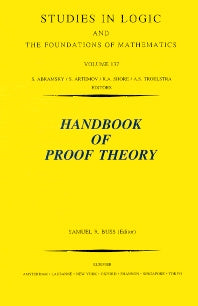Freshly Printed - allow 10 days lead
Couldn't load pickup availability
Handbook of Proof Theory
S.R. Buss (Edited by)
9780444898401, Elsevier Science
Hardback, published 9 July 1998
810 pages
23.4 x 15.6 x 4.1 cm, 1.41 kg
Toshiyasu Arai
"The Handbook is most welcome in the logic community. I recommend the Handbook to researchers and graduate students in logic, mathematics, computer science, philosophy, linguistics, artificial intelligence, automated reasoning and cognitive sciences." --Bulletin of Symbolic Logic
This volume contains articles covering a broad spectrum of proof theory, with an emphasis on its mathematical aspects. The articles should not only be interesting to specialists of proof theory, but should also be accessible to a diverse audience, including logicians, mathematicians, computer scientists and philosophers. Many of the central topics of proof theory have been included in a self-contained expository of articles, covered in great detail and depth. The chapters are arranged so that the two introductory articles come first; these are then followed by articles from core classical areas of proof theory; the handbook concludes with articles that deal with topics closely related to computer science.
Preface. List of Contributors. Chapter I. An Introduction to Proof Theory (S.R. Buss). Chapter II. First-Order Proof Theory of Arithmetic (S.R. Buss). Chapter III. Hierarchies of Provably Recursive Functions (M. Fairtlough, S.S. Wainer). Chapter IV. Subsystems of Set Theory and Second Order Number Theory (W. Pohlers). Chapter V. Gödel's Functional ("Dialectica") Interpretation (J. Avigad, S. Feferman). Chapter VI. Realizability (A.S. Troelstra). Chapter VII. The Logic of Provability (G. Japaridze, D. de Jongh). Chapter VIII. The Lengths of Proofs (P. Pudl´k). Chapter IX. A Proof-Theoretic Framework for Logic Programming (G. Jäger, R.F. Stärk). Chapter X. Types in Logic, Mathematics and Programming (R.L. Constable). Name Index. Subject Index.
Subject Areas: Expert systems / knowledge-based systems [UYQE], Artificial intelligence [UYQ], Algorithms & data structures [UMB], Discrete mathematics [PBD], Mathematical logic [PBCD]


